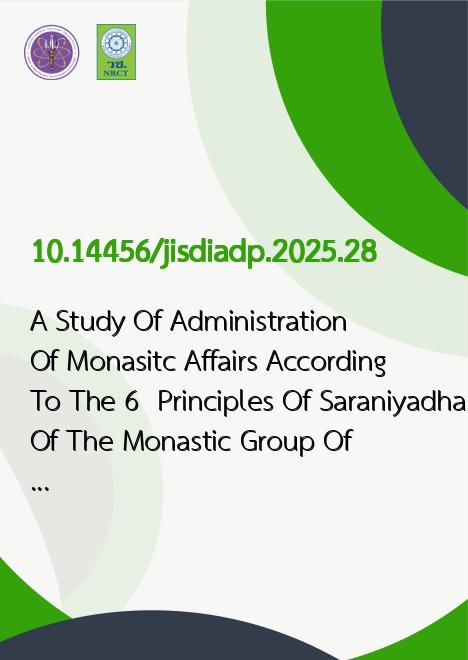
|
A Study Of Administration Of Monasitc Affairs According To The 6 Principles Of Saraniyadhamma Of The Monastic Group Of Mak Khaeng Subdistrict, District 2, Mueang District, Udonthani Province |
|---|---|
| รหัสดีโอไอ | |
| Creator | Pramahapatipan inthipanya (lintong) |
| Title | A Study Of Administration Of Monasitc Affairs According To The 6 Principles Of Saraniyadhamma Of The Monastic Group Of Mak Khaeng Subdistrict, District 2, Mueang District, Udonthani Province |
| Contributor | Phramaha Paitool Siridhammo, Somdet Namket, Arithat loesruamchok |
| Publisher | DR.KET INSTITUTE OF ACADEMIC DEVELOPMENT AND PROMOTION |
| Publication Year | 2568 |
| Journal Title | Journal of Interdisciplinary Social Development |
| Journal Vol. | 3 |
| Journal No. | 1 |
| Page no. | 425-438 |
| Keyword | Monastic Administration, Six Principles of Sārāṇīyadhamma, Sangha |
| URL Website | https://so12.tci-thaijo.org/index.php/JISDIADP/index |
| Website title | https://so12.tci-thaijo.org/index.php/JISDIADP/index |
| ISSN | 2822-1060 |
| Abstract | This research aims to (1) study the six principles of Sārāṇīyadhamma in Buddhism, (2) examine the current state of monastic administration in Makkhaeng Subdistrict, Zone 2, Mueang District, Udon Thani Province, and (3) analyze how these principles are applied in monastic administration. A qualitative research methodology was employed, gathering data from documents and in-depth interviews with 25 key informants.1. The findings reveal that the six principles of Sārāṇīyadhamma—Metta Kāyakamma (benevolent bodily action), Metta Vācīkamma (benevolent speech), Metta Manokamma (benevolent mental action), Sādhāraṇabhogī (sharing of material resources), Sīlasāmaññatā (moral harmony), and Diṭṭhisāmaññatā (consensual views)—promote unity, harmony, and cooperation within the monastic community while enhancing administrative efficiency and transparency.2. The current state of monastic administration is characterized by a well-defined governance structure and strong community relations. However, challenges remain, including resource shortages, limited personnel, and the need for adaptation to modern society, particularly in education, Dhamma dissemination, and community development.3. The application of Sārāṇīyadhamma in monastic administration in Makkhaeng Subdistrict, Zone 2, indicates that Metta Kāyakamma and Sīlasāmaññatā strengthen unity in governance, while Diṭṭhisāmaññatā and Metta Manokamma enhance religious education. Metta Vācīkamma fosters positive relationships in Dhamma dissemination, and Sādhāraṇabhogī and Metta Kāyakamma support social welfare and community development. Integrating these principles improves administrative efficiency, transparency, and overall benefits for both the monastic community and Buddhism. |
